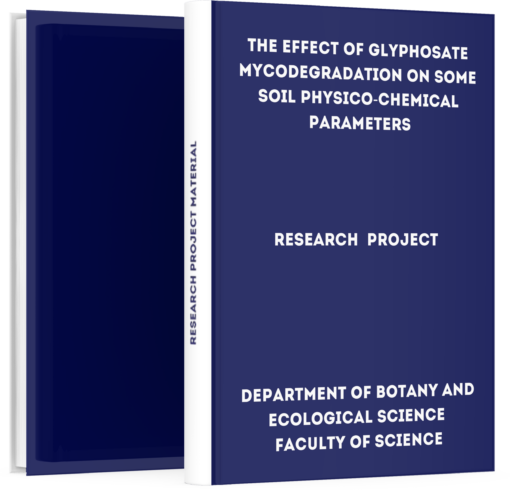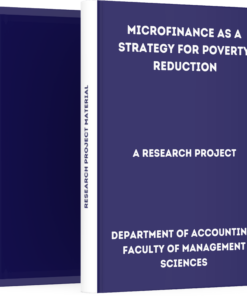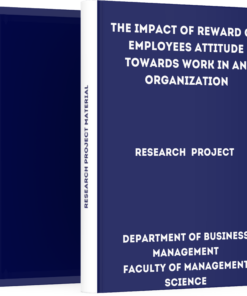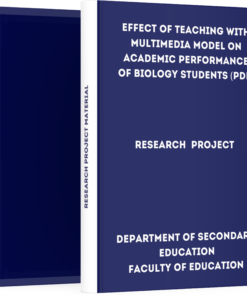The Effect of Glyphosate Mycodegradation on Some Soil physico-Chemical Parameters (PDF)
₦3,000.00
If you are interested in getting this project material “The Effect of Glyphosate Mycodegradation on Some Soil physico-Chemical Parameters (PDF)”, click on the DOWNLOAD BUTTON to make payment and the file will be delivered to your email immediately after confirmation.
Description
– The Effect of Glyphosate Mycodegradation on Some Soil physico-Chemical Parameters –
Download The Effect of Glyphosate Mycodegradation on Some Soil physico-Chemical Parameters . Students who are writing their projects can get this material to aid their research work.
Abstract
Bioaugmentation involves using a consortium of microorganisms to depollute an impacted medium.
Bioremediation of pollutants by natural attenuation requires no human intervention, whereas the implementation of accelerated and controlled biotreatment-based processes may be directed to exploiting microbial technology and bioprocess engineering to optimize the rate or extent of pollutant degradation.
Upon the foregoing, a study was undertaken to ascertain the comparative effects of fungal degradation of glyphosate on some physicochemical properties of soil using Randomized Complete Block Design (RCBD).
In this attempt, five Treatments were used viz: T1 (Fungi+herbicide+plant), T2 (No fungi+Herbicide+plant), T3 (Fungi-Herbicide+plant), T4 (Fungi+herbicide+plant) and T5 ().
The results indicated that the addition of fungal strains imparted a significant difference (P=0.05) in organic matter content and pH of the studied soils when compared with the control.
However, the mean value of exchangeable acidity, ECEC, textural properties and electrical conductivity in the soil were not significantly affected by the application of Treatments.
The fungal isolates employed in this research further imprints some promises as eco-friendly and economical alternatives in managing the problems associated with the use of conventional herbicides.
KEYWORDS: Glyphosate, Herbicides, Bioaugmentation.
Introduction
1.1 Background of the Study
Pesticides are any substance or mixture of substances intended for preventing, destroying, repelling or mitigating any pest (insects, rodents, nematodes, fungus, weeds and other forms of terrestrial or aquatic plant or animal (Mishra et al, 2001).
Pesticides are directly toxic to pests, having indirect effects on soil microorganisms as well as soil properties (Mishra et al, 2001).Mishra et al, (2001) observed that physico-chemical properties of the soil, nature of substrates and environmental degradation determine the persistence of pesticides in nature.
Excessive persistent and biological active residues endanger non-target organisms, prove hazardous and make the pest control operation uneconomical.
In recent times there has been a steady increase in the number and amount of residues of pesticides in our food and soil (Behera and Mishra, 2001). While pesticides serve useful purposes, concern has been expressed regarding their possible effect on the environment.
Persistence of pesticides in soil depends on their dose as much as on the characteristics of the soil, such as physicochemical properties, structure, temperature and moisture (Brusch, 2010).
The toxic effect of pesticides on humans and the environment can be direct or indirect. One of the possible side-effects of using herbicides involves some disturbance of the biochemical processes occurring in soil (Digrak and Ozcelik, 1998).
Active substances found in many herbicides may hamper the rate of a series of biochemical processes, interfering with the soil enzymatic activity and microbial growth.
Modifications in the count and activity of microorganisms may lead to upsetting the biological equilibrium of soil, which in turn depresses its fertility.
How to Download this Project Material
First, note that we are one of the best and most reliable online platforms because we don’t retain any of your personal information or data as regards making payments online.
PRICE: ₦3,500 ₦3,000 (Three Thousand Naira Only)
Make a bank deposit or mobile transfer of ₦2,000 only to the account given below;
Bank Name: UBA Account Number: 1022564031 Account Name: TMLT PRO SERVICES
After making the payment, CLICK HERE to send the following on WhatsApp;
- Depositor’s Name or Screenshot of Payment
- Name of the Past Question
- Active Email Address
or Call Us On +2348082284439 Once your details have been received and your payment confirmed by us, you will receive the past question in your email or WhatsApp within 5 Minutes.
Guarantee of Getting the Material
We understand that due to the high rate of fraud, many people are afraid of making purchases online but be rest assured that PastExamQuestions will deliver your material after payment.
Once your details have been received and your payment confirmed by us, you will receive the past question in your email or WhatsApp.
Give us Feedback
Have we been able to satisfy you? How well do you think the material will be helpful after having gone through it? Does the price worth the material?
Let’s hear from you! We recommend that our customers give feedback at the end of every transaction to enable us to serve better. You can do this by clicking the review button on this page.
Where is the review button? >> Just scroll up to where you see reviews





Reviews
There are no reviews yet.